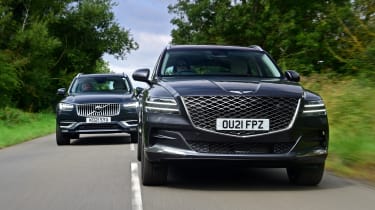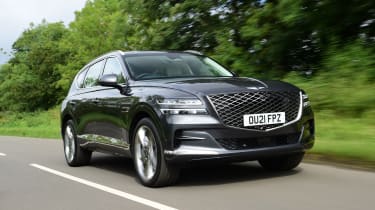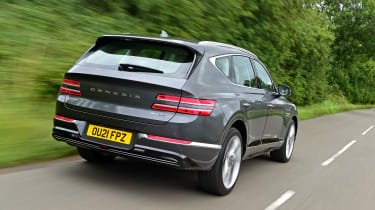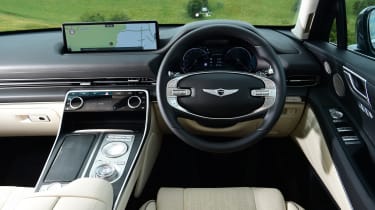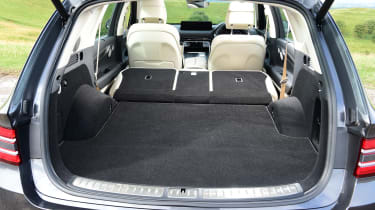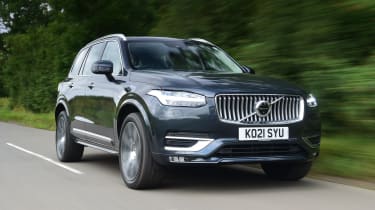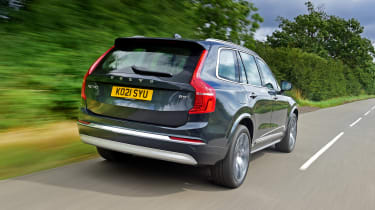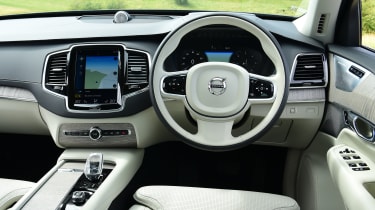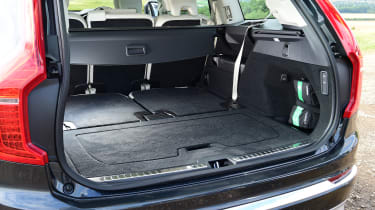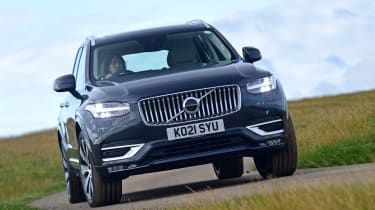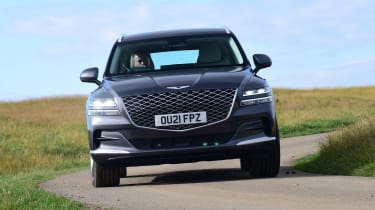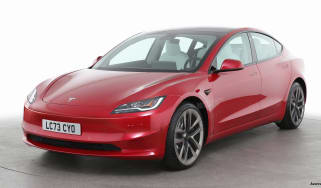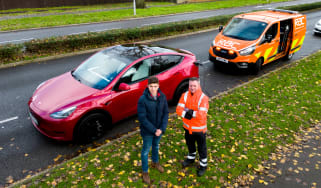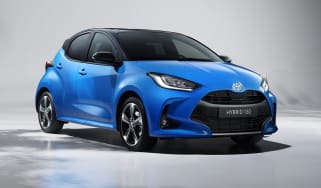Genesis GV80 vs Volvo XC90: 2021 group test review
The Genesis GV80 is looking to makes waves in the luxury SUV segment - standing in its way is the Volvo XC90
It's a rare occurrence for a new car brand to break into the UK market. It’s even less common for a brand to wade into the most hotly contested areas of the market and grab a foothold instantly. In the premium sector, badge appeal holds a lot of weight, and it takes a long time to overcome the established names. Just ask Lexus – despite competing for over 30 years, it still struggles to achieve even a fraction of the sales of Audi, BMW and Mercedes.
So will the struggle be the same for Genesis? Well, it’s launched with an ambitious range – including SUVs, saloons, a shooting brake and even a full EV – that aims to take on the very best rivals that Europe has to offer.
The GV80 is its current flagship SUV, and aims to woo buyers away from the better-known alternatives by combining a high-quality interior, cutting-edge tech and a unique style.
One of the leaders in this area is Volvo. Its XC90 brings an impressive blend of luxury, safety and practicality to the segment, which means it’s the model the GV80 needs to go head-to-head with for it to be judged a credible competitor.
Genesis GV80
| Model: | Genesis GV80 3.0D AWD Luxury 7 Seat |
| Price: | £62,915 |
| Engine: | 3.0-litre 6cyl turbodiesel, 274bhp |
| 0-62mph: | 7.5 seconds |
| Test economy: | 33.8mpg |
| CO2: | 220g/km |
| Annual road tax: | £490 |
Our GV80 test car was a five-seat model, although for an extra £500 you can order an extra pair of seats to align more closely with the XC90, which we’ll use for the basis of this comparison. In this top-spec luxury trim the GV80 is priced from £62,915, but the addition of the Innovation Pack (£3,900) and metallic paint (£750) bumps that figure up to £67,565.
More reviews
Road tests
Design & engineering
Genesis isn’t exactly a standalone. It’s a premium offshoot of the Hyundai empire, which means its models share many platforms, engines and tech with a wide range of those from its parent company and Kia.
The GV80, however, is on an all-new layout for the group. Known as M3, it’s shared with the G80 saloon, and enables the use of both rear- and four-wheel-drive layouts, the latter used here.
Multi-link suspension is fitted front and rear, but unlike some rivals (including top-spec versions of the XC90) air springs are not available. Alloy wheels measure 20 inches on the Premium trim and a vast 22 inches on the Luxury model.
The GV80 line-up is offered with a choice of a 2.5-litre, four-cylinder turbocharged petrol engine with 300bhp or, for £100 more, the model in this test: a 3.0-litre inline-six turbodiesel. It makes 274bhp and musters a hefty 588Nm of torque, which is available from 1,500rpm to 3,000rpm. That means it’s not only two cylinders up on the XC90, but it makes 42bhp and 108Nm more. It needs it though, because at 2,300kg, the GV80 is heavier than the 2,101kg Volvo.
One area where Genesis has really made a great first impression is in the cabin. The clean, rounded styling carves out a design that’s unlike anything else in the class, but it’s also finished to a standard that is easily a match for the Volvo. The knurled finish to the column stalks and the rotary gear selector gives a promising sign that plenty of attention has been paid to the smallest details.
Driving
While Genesis has paid attention to the smaller stuff, there are one or two more fundamental aspects of how the GV80 drives which show that the brand isn’t quite able to compete with some of the more dynamically adept established marques.
We’ll kick off with one area which does impress though, and that’s the engine. The inline-six unit under the bonnet might not deliver the ultimate in power or performance – although the 0-62mph time of 7.5 seconds still shades the Volvo in this contest – but it is a smooth, refined engine that, by diesel standards, even makes a fairly pleasing sound. Thanks to 588Nm of peak torque that comes in from just 1,500rpm, the eight-speed automatic gearbox is rarely forced into kicking down a ratio.
Contrary to what’s going on under the bonnet, the interaction between the GV80’s body and the road is less impressive. The suspension feels neither soft enough to rival the most relaxing rivals, nor firm enough to feel the sharpest. Paired with the 22-inch wheels of Luxury trim, it fidgets over small bumps and never really settles at speed. Equipped with the air suspension set-up, the Volvo feels better controlled and smoother than the Genesis – and even on standard springs the Swede feels more sophisticated. With either set-up, the XC90’s lighter steering makes it feel more wieldy than the GV80.
Practicality
When it comes to passenger accommodation, the Genesis is just a tiny margin behind the Volvo. The middle row has plenty of space for adults, with the Volvo offering slightly more kneeroom. The XC90 also has a larger gap under the front seats for feet, although the Genesis provides a touch more headroom – but the Volvo in this test had a panoramic sunroof, which slightly reduces available space.
The GV80’s roofline slopes quite dramatically towards the rear of the car – this means the third row will feel a little cramped compared to the Volvo’s. Overall interior storage is reasonable, but the door pockets aren’t as roomy as the XC90’s.
Open the boot with the catch neatly integrated into the fixing for the rear wiper, and the GV80 reveals a generous load space, but the floor is slightly higher than the XC90’s and the wheelarches intrude a little.
Mild-hybrid versions of the Volvo get a space-saver spare wheel as standard, but seven-seat versions of the Genesis are offered with only a puncture repair kit. Five-seat models of the GV80 can be specified with a spare wheel for an extra £40.
Ownership
Genesis has ambitions to offer owners a premium feel not only in the car itself, but in its aftersales service, too. This comes in the form of a five-year care plan; the original retail price of the car includes a warranty, servicing (including home collection and delivery) and breakdown cover for the full period – significantly greater cover than any of its rivals can offer.
Running costs
Some brands that price themselves against premium rivals often struggle when it comes to residual values. However, the GV80 depreciates slower than the Volvo: after three years and 36,000 miles it is predicted to retain 53.6 per cent of the original price compared with 46.9 per cent for the Volvo. Factor in this alongside the fact that servicing costs are not a consideration, and the running costs will be quite competitive.
There’s a fly in the ointment, though: a lack of an electrified option means that, for company car users, the GV80 is much more expensive than plug-in hybrid rivals – a powertrain that Volvo also offers with the XC90. The pair in this test will cost more than £9,000 per year for a higher-rate earner.
Testers’ notes
“The GV80’s lane assist can work independently of the cruise control, so it can steer you along a motorway while you dictate the speed with the pedals.”
Volvo XC90
| Model: | Volvo XC90 B5 AWD Inscription Pro |
| Price: | £66,885 |
| Engine: | 2.0-litre 4cyl turbodiesel, 232bhp |
| 0-62mph: | 7.6 seconds |
| Test economy: | 34.2mpg |
| CO2: | 189g/km |
| Annual road tax: | £480 |
The Volvo XC90 is available in three trim levels, the top two of which come with upgraded Pro variants, too. As an Inscription Pro, this is the most luxurious model in the range, just like the GV80 it competes with. At £66,885, it’s pricier than its rival, and that’s before options; walk into a main dealer today, and the car you see here would set you back £73,395.
Design & engineering
The launch of the Mk2 XC90 back in 2015 marked a new era for Volvo from which it has not looked back. The brand’s flagship SUV became the first new car to bear the fruits of changing ownership from Ford to Geely, because it made use of the Scalable Product Architecture (SPA) platform that has formed the basis of every 60 and 90-badged Volvo since (plus the rare Polestar 1).
The layout had been developed to accommodate cutting-edge safety tech and plug-in hybrid powertrains, both of which now form key pillars of Volvo’s appeal in this segment.
It also introduced a new design language, which forms a clean, minimalist look that on the outside appears less flashy than the Genesis and its traditional German rivals. The inside is similarly understated, with an uncluttered appearance highlighted only by optional open-pore wood trims that look and feel sumptuous. Smart though it is, the touchpoints feel more expensive in the GV80.
That’s a word that can also be applied to the seat comfort. The seats in the Genesis feel supportive enough – and inflatable side bolsters will even squeeze you gently if you find a road where you can legally reach 81mph – but the Volvo offers softer cushioning that supports weight better.
The Inscription Pro trim level driven here rides on a fully adaptive air-sprung system as standard. It’s a feature available on many contenders in this segment, but not the Genesis. The rest of the XC90 line-up runs on a more conventional passive set-up.
Driving
Volvo's engineers have taken the right approach with the XC90; they realise that this is first and foremost a practical family SUV, so have placed an emphasis on comfort and ease of use rather than a sporty feel. To that end, the light controls mean that even for those not used to driving a near-five-metre-long vehicle, it doesn’t feel that intimidating to manoeuvre in town.
Once up to speed, the ride remains less fidgety than the GV80’s, and the Volvo feels more sure-footed over larger bumps and uneven cambers. This is when the XC90 is equipped with air suspension, but even lower down the range, without the air system, the Volvo still feels more sophisticated.
While the XC90’s engine is down by two cylinders and 42bhp relative to the GV80’s 3.0-litre diesel unit, the Volvo also weighs the best part of 200kg less than its rival. As a result, its 0-62mph time of 7.6 seconds is just 0.1 seconds behind the GV80’s.
In the real world, the Volvo feels like it needs to be worked harder to make similar progress, and its eight-speed automatic gearbox shifts down more often. The four-cylinder unit is also less refined than the GV80’s straight-six; there’s a subtle telltale diesel clatter, especially under hard acceleration.
Practicality
We won’t read too much into the outright figures of the two boot volumes, because in this case the two cars are measured to slightly different standards. However, the Volvo generally has a slight edge – especially with all seven seats in place, where the overall volume is still largely on par with a typical five-door hatchback. Impressive, in other words.
It’s full of useful features too: buttons in the back can drop the back seats so you don’t have to reach in and haul on levers; there’s a small partition in the floor to keep smaller loads secure: and back-row occupants each get their own air vent and cup-holder. Interior space, particularly legroom, is excellent; while the Genesis is hardly cramped, the Volvo feels even more light and airy for adult passengers.
Ownership
Volvo's long-standing reputation for safety is entirely justified – its testing facility in Sweden puts its cars through a more rigorous testing process than even Euro NCAP’s. Through both passive and active safety features, the brand has committed to a “Vision 2020” pledge that no occupants will die in a collision in its cars built after 2020. It’s no surprise then, to discover that the XC90 is a five-star rated car in the NCAP tests, scoring a 97 per cent adult occupant protection score back in 2015. The Genesis was tested this year to even more rigorous standards, yet also achieved a five-star score.
It’s not just out on the road where Volvo drivers are taken car of, either. In the latest Driver Power owners’ survey, its dealers were ranked an impressive seventh best in the UK. Its cars fared well as an overall ownership prospect, too, finishing ninth best out of 29 brands. As a newcomer to our market, Genesis has yet to be assessed.
Running costs
The mild-hybrid tech integrated within the Volvo’s powertrain doesn’t do much to disguise the fact that this is fundamentally a heavy SUV with a relatively small-capacity diesel engine. At 34.2mpg, it proved to be only 0.4mpg more frugal than the GV80 in our tests – we’d really hope for a bigger difference between them, considering the fact that the XC90 is less refined and less powerful.
The Volvo will also be more expensive to run than the Genesis throughout the first five years of its life, because GV80 owners get the first 60 months of servicing for free. Depending on the service interval, XC90 maintenance costs between £281 and £399.
Testers’ notes
“This XC90’s integrated child booster is a £200 extra. Designed for kids who weigh 15-36kg and are at least 97cm tall, it raises them to a more comfortable – and safer – height for the seatbelt.”
Verdict
First place: Volvo XC90
Both SUVs have their own distinct strengths, and in the end the verdict is so close that it has to come down to cost. Based on the monthly PCP most buyers now choose, the XC90 deserves the nod. Engine aside, it’s better to drive than the Genesis and is slightly more practical. The Google tech is a big improvement on Volvos of old, and safety and ownership scores are both excellent.
Second place: Genesis GV80
While it takes second place here, the GV80 still holds a huge amount of appeal. It feels special inside, it holds its value marginally better than the Volvo, has more standard kit and costs less to buy outright – although not on finance. The five-year care package gives great peace of mind, too. It isn’t perfect, but the GV80 is the most convincing Genesis product so far.
Also consider...
- Used: Porsche Cayenne E-Hybrid
- Price: £65,000
- Engine: 3.0-litre 6cyl, 456bhp
For similar cash to these two new SUVs, it’s possible to bag a 2018 Porsche Cayenne with a super-frugal plug-in hybrid powertrain. It’s sharper to drive and plusher than either, and delivers all the performance you’d expect, but with potentially tiny fuel bills.
Range Rover
- Used: Range Rover 4.4 SDV8 Vogue SE
- Price: £65,000
- Engine: 4.4-litre 8cyl, 334bhp
Luxurious though our two contenders feel, neither can match the opulence or the image of the Range Rover. Refinement and comfort are first-class, while the V8 diesel delivers effortless shove. We found several 2018 models for £65k.
Figures
| Volvo XC90 B5 AWD Inscription Pro | Genesis GV80 3.0D AWD Luxury | |
| On the road price/total as tested | £66,885/£73,395 | £62,915/£67,565 |
| Residual value (after 3yrs/36,000) | £31,376/46.9% | £33,439/53.2% |
| Depreciation | £35,509 | £29,476 |
| Annual tax liability std/higher rate | £4,880/£9,759 | £4,552/£9,104 |
| Annual fuel cost (12k/20k miles) | £2,227/£3,711 | £2,253/£3,755 |
| Insurance group/quote/VED | 42/£958/£480 | 47/N/A/£490 |
| Servicing costs | £281/£314/£399 | £0 (5 years) |
| Length/wheelbase | 4,953/2,984mm | 4,945/2,955mm |
| Height/width | 1,776/2,008mm | 1,715/1,975mm |
| Powertrain | 4cyl mild hybrid/ 1,969cc | 6cyl turbodiesel/ 2,996cc |
| Peak power | 232bhp/4,000rpm | 274/3,800 bhp/rpm |
| Peak torque | 480Nm/1,750rpm | 588/1,500 Nm/rpm |
| Transmission | 8-spd auto/4wd | 8-spd auto/4wd |
| Fuel tank capacity/spare wheel | 71 litres/sp saver | 80 litres/repair kit |
| Boot capacity (7/5/2 seats) | 451/1,102/1,951 l | N/A/727/2,144 l |
| Kerbweight/payload/towing capacity | 2,101/670/2,700kg | 2,300/705/2,722kg |
| Turning circle | 11.9 metres | 11.9 metres |
| Basic warranty (miles)/recovery | 3 yrs (60k)/1 yr | 5yrs (100k)/5yrs |
| Driver Power manufacturer/dealer pos | 9th/7th | N/A |
| NCAP: Adult/child/ped./assist/stars | 97/87/72/94/5 (’15) | 91/87/66/88/5 (’21) |
| 0-62mph/top speed | 7.6 secs/112mph | 7.5 secs/143mph |
| Auto Express economy/range | 34.2/534 miles | 33.8mpg/595 miles |
| WLTP combined | 39.2mpg | 33.1mpg |
| WLTP combined | 8.6mpl | 7.3mpl |
| Actual/claimed CO2/tax bracket | 221/189g/km/37% | 224/220g/km/37% |
| Airbags/Isofix/park sensors/camera | Seven/yes/yes/yes | 10/yes/yes/yes |
| Auto/lane keep/blind spot/AEB | Yes/yes/yes/yes | Yes/yes/yes/yes |
| Climate/cruise/leather/heated seats | Yes/adap/yes/yes | Yes/yes/yes/yes |
| Met paint/LED lts/keyless/pwr tailgate | £715/yes/yes/yes | £750/yes/yes/yes |
| Sat-nav/dig dash/DAB/connect’d serv | Yes/yes/yes/yes | Yes/yes/yes/yes |
| Wireless charge/CarPlay/Android Auto | £250/yes/yes | £3,900*/yes/yes |
